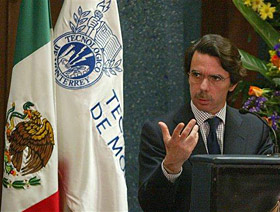 |
 |
 |
 News from Around the Americas | July 2005 News from Around the Americas | July 2005  
Mexico, Spain Fail to Reach Migration Agreement During Bilateral Meetings
 Will Weissert - Associated Press Will Weissert - Associated Press


| | Former spanish Prime Minister Jose Aznar speaks to students at the Technological Institute of Monterrey about the terrorist attacks on Spain last year. (Photo: Juan Manuel Villasenor) |
A series of high-level meetings between Mexican and Spanish officials ended Thursday without a migration agreement that Mexico had hoped for.

The government here wants to send 40,000 workers for long periods of time to Spain in order to fill employment gaps there, and was hoping Madrid would offer legal status as part of an agreement similar to one Mexico has with Canada.

But a joint statement signed by Mexican Foreign Secretary Luis Ernesto Derbez and his Spanish counterpart, Miguel Angel Moratinos, at the end of the bilateral discussions pledged only to "continue conversations" on the would-be agreement.

"Both countries are convinced that there should be work done on a legal process that corresponds to the needs of both nations," Derbez said at a joint new conference with Moratinos. "We are working on a definition, but will need time for negotiation. ... If we set dates, it's a given that we will not meet them, so for now we aren't setting dates, but working on a process."

Moratinos said his country's willingness for an agreement "is still there."

"We have advanced in this area and clearly it should be seen as positive," he said.

When asked if any particular disagreement was holding up an accord, Derbez shot back, "The press is inventing something that doesn't exist, OK?"

"We are working, there is no point of contention," he added.

Both countries pledged to share information, as well as increase cooperation between their security forces and legal systems as part of the war on terror. But they also promised that increased security measures would not diminish human rights guarantees.

In July 2003, Mexico arrested five men and a woman accused in Spain of involvement in the radical Basque separatist group ETA. The defendants, most of whom have been living in Mexico for years, say they are not ETA members and have challenged a Spanish extradition request on terrorism charges in Mexico's Supreme Court.

The high court ruled last week that the accused ETA members are not eligible for bail while they appeal. When it will rule on the extradition process was unclear, however.

Moratinos said he was confident the suspects would be extradited to Spain once their appeal process had been exhausted. He said that for terrorists worldwide "the message is clear: They will be defeated."

"They will be defeated by the defense of precisely what they want to destroy, that is, a community of principles, values, and the rule of law that makes western civilization great," he said. "I believe the best way to do this is by reinforcing international cooperation."

Asked about the possibility that Mexico could break with its fiercely isolationist past and join Spain and nations across Latin America in sending soldiers to participate in U.N.-directed peacekeeping missions, Derbez said the Mexican government does its part by providing financial support.

"In Mexico, it's at least a topic that has to be discussed," Derbez said of sending Mexican forces abroad. "It's a topic of foreign relations of course, and for a long time it has been considered taboo in our country. But, fortunately, now it's not considered taboo."

Moratinos also met Thursday with Mexico City's popular mayor, Andres Manuel Lopez Obrador, and drew laughs when he slipped and called him "president."

President Vicente Fox is barred from seeking a second term, and the left-leaning Lopez Obrador has emerged in numerous public opinion polls as the current favorite to win the post in the July 2006 presidential election. | 
 | |
 |



